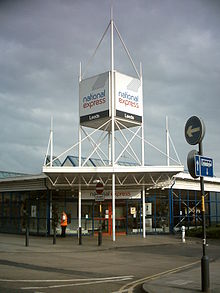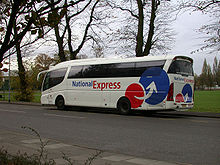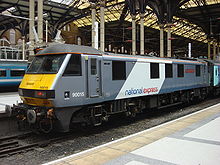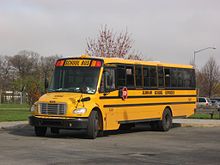- National Express Group
-
"National Express" redirects here. You may also be looking for National Express Coaches, the coach brand
National Express Group plc 
Type Public (LSE: NEX) Industry Public Transport Founded 1972 (National Express Branding)
1992 as National Express Group plcHeadquarters Birmingham, United Kingdom Area served United Kingdom, Spain and North America Key people John Devaney
(Chairman)
Dean Finch
(Chief executive)Products Bus, Train and Tram Services Revenue £2,125.9 million (2010)[1] Operating income £204.2 million (2010)[1] Net income £62.3 million (2010)[1] Employees 40,000 (2010)[2] Website nationalexpressgroup.com Corporate Site
nationalexpress.com Consumer Portal
nationalexpresscorp.com North America OperationsNational Express Group plc (LSE: NEX) is a British transport group headquartered in Birmingham that operates bus, coach, rail and tram services in the UK, the US and Canada, Spain, Portugal and Morocco and long-distance coach routes across Europe. It is listed on the London Stock Exchange and is a constituent of the FTSE 250 Index.
Contents
History
The National Express brand was created in 1972 by the state-owned National Bus Company (NBC) to bring together the express bus and coach services operated by the bus operating companies within the NBC group.[3] The National Express network was largely a branding and management exercise, with services continuing to be operated by the individual companies.
With the privatisation of the NBC in the 1980s, National Express was subject to a management buy-out in 1988. The management team began to diversify, and acquired the bus company Crosville Wales, but its financial performance began to deteriorate from early 1990. A new management team took over the company in 1991, with the backing of development and venture capital investors. The new team refocused the group on its core activities and sold Crosville Wales.[4] In 1992, National Express Group PLC was floated on the London Stock Exchange[3] with a remit to acquire new businesses in the passenger transport market.
Acquisitions
In 1993 the group acquired Eurolines and East Midlands Airport,[5] although the latter has since been sold.
In 1995, West Midlands Travel, the formerly municipally-owned bus network of Birmingham and the West Midlands, was acquired[3] and renamed Travel West Midlands in September 1996. This began the brand family of Travel ... local bus operations. Since then Travel Coventry has been spun out of Travel West Midlands, and Travel Dundee and Travel London have been acquired.
In 1996 the group acquired its first UK rail franchises, Gatwick Express and Midland Mainline. Since then seven further franchises have been added, and rail services now account for the largest portion of the group's activity.[3]
In 2005 National Express agreed to buy most of operations of privately owned Spanish transport operator ALSA, which operates bus and coach services in Spain, Portugal and Morocco, and long-distance coach services to other parts of Europe. Alsa's operations in South America and China were retained by the previous owners.[6]
Also in mid 2005, the group bought the London buses arm of Tellings Golden Miller and branded it Travel London. This included a number of services in South West London and Surrey.[7]
In 2007 National Express acquired Continental Auto, the second largest bus and coach operator in Spain.[8]
The group has also moved into operations outside Europe. At one time it had extensive bus, rail and tram operations in Australia, but with the collapse of the group there, all operations were either sold off or had control returned to the State Government (see the "Australian operations" section below). Only one bus operator was retained, Westbus in Australia. It led to a strange situation developing, as Westbus at the time of acquisition owned a subsidiary operation in London, called Westbus in Australia that still operates and is managed from Sydney.
Restructuring
On 11 November 2007, National Express Group announced plans to re-brand their constituent companies under a new unified National Express identity.[9] This is intended to achieve greater recognition for all the group companies, to coincide with recent rail acquisitions and after current rail operations had improved in reliability to warrant association with the established express coach image. It also coincides with the appointment of a group director for all UK operations and relocation of the head office from Victoria in London to Birmingham, bringing all operations under a single strategic management structure. Day to day management remains within individual companies.[10]
On 21 May 2009, National Express Group agreed to sell Travel London to NedRailways (now Abellio), a subsidiary of NS Dutch Railways, for a price of £32 million. The sale includes the 66 bus routes in London and Surrey. All vehicles and premises used were sold, and all staff transferred to NedRailways.[11]
July 2009 nationalisation of the East Coast Line
On 1 July 2009, the Department for Transport announced that it would take the London-to-Edinburgh route into public ownership at the end of the year, and the contract would be put back out to tender at the end of 2010.[12] Further controversy ensued when, on 27 July 2009, the Commons Transport Committee said that ministers should consider operating the East Coast Main Line as a public railway after National Express announced they would walk away. The committee said it was "unacceptable" that the company might be able to "cling on" to its other rail franchises, including the London to Tilbury and Southend route.[13] The East Coast left the National Express group on the 14 November 2009.[14] Also in November 2009, the government announced that it was to terminate their other franchises in 2011, c2c and National Express East Anglia, at which point they would be put out to tender and National Express Group would not be permitted to rebid. This decision was widely expected after defaulting on the National Express East Coast franchise and having to surrender it.
Operational safety concerns
In July 2009, a junior transport minister, the Gillingham MP Paul Clark, spelt out a series of concerns to National Express in a letter following a meeting with an employee of National Express East Coast who lives in his constituency. The worker claimed that due to reduced maintenance checks, some trains were in use with defective brakes, an allegation strongly denied by the company, which said it would "never compromise on safety". He wrote: "As a result of reduced maintenance checks, 'some long-haul sets [trains] are in use with brake defects'. Increasing cuts in staff combined with an increasing pressure to ensure that trains run safely has resulted in fears among staff that a major accident is 'just around the corner'." Passengers, he added, "have been 'poisoned' as a result of coffee machines not being cleaned correctly, with cleaning fluids left in situ". The minister said he was "shocked and appalled at the information with which I've been provided. You will understand that these allegations are exceptionally serious".[15]
Offers for the company
On 29 June 2009, National Express rejected a takeover bid from fellow transport operator FirstGroup, saying it didn't "consider it appropriate" at the present time to discuss a takeover.[16] This was followed in August 2009 by its main shareholder Spain's Cosmen family & CVC Capital Partners for £765 million.[17] The UK Takeover Panel set a deadline of 11 September 2009 for all prospective bids.[18]
The Group agreed to open its books to the Cosmen and CVC consortium on 10 September 2009,[19] though had reportedly been looking into selling its bus and rail franchises to rival Stagecoach Group, according to The Times.[20] The deadline for bids was subsequently extended to 16 October 2009.[21]
The consortium led by the Cosmen family abandoned their bid on 16 October 2009, leading to a drop in shares of 26%.[22] Stagecoach later submitted a new solo all-share bid. The company had initially ruled out making an independent bid, and had agreed with the Cosmen consortium to purchase the group's rail and bus services.[23]
Operations
The Company's operations are summarised below:[24]
UK and Europe
Bus and coach services
The bus and coach services operated by the group are:
Bus operations
 The entrance from Dyer Street to the National Express concourse of the City Bus and Coach Station in Leeds, West Yorkshire
The entrance from Dyer Street to the National Express concourse of the City Bus and Coach Station in Leeds, West Yorkshire
- AirLinks (contract bus operation at UK airports)
- National Express Dundee (bus operation in and around Dundee, Scotland, UK)
- Travel Greyhound (coach arm of National Express Dundee)
- G&N Wishart (Rural bus and coach arm of National Express Dundee)
- National Express West Midlands (Major bus operations in Birmingham and the West Midlands, UK)
- National Express Coventry (bus operation in and around Coventry, UK - A subsidiary of National Express West Midlands)
- Continental Auto (bus operation in Spain)
Coach operations
- Eurolines (express coach services between the UK and other European countries)
- National Express Coaches (long distance express and airport coach services in the UK)
- ALSA (coach services in Spain and Western Europe)
- The King's Ferry (commuter services and private coach hire)
Tram and railway services
The tram and railway services operated by the group are:
Tram services
- Travel Midland Metro (Midland Metro light rail system in the West Midlands, UK)
Railway services
 National Express' branding for the Stansted Express
National Express' branding for the Stansted Express
- c2c (passenger rail operation in the UK)
- Maintrain (train maintenance in the UK)
- National Express East Anglia (passenger rail operation in the UK)
- Stansted Express (sub brand of National Express East Anglia)
London and Continental Railways
The structure of LCR is complex due to numerous reorganisations, for example SNCF is involved in the Eurostar operation at three different levels. shareholders in LCR in 2006 were:
- Rail Link Engineering (RLE)
- National Express Group
- SNCF
- EDF Energy
- UBS
Since the 1998 reorganisation the operation of EUKL has run as under a management contract, expiring in 2010, by InterCapital and Regional Rail (ICRR). ICRR shareholders are:
- National Express Group (40%)
- SNCF (35%)
- NMBS/SNCB (15%)
- British Airways (10%)
Operation of the line is undertaken by Network Rail under a contract lasting until 2086, when LCR's concession ends too, and all rights return to the British Government.
This structure will change as per the announcement made in June 2009.
USA and Canada
Bus and coach services
- ATC (transit and paratransit bus operation in the US)
- Durham School Services (school bus operation in the US)
- Stock Transportation (school bus operation in Canada)
Former operations
UK rail franchises
Rail franchises lost in refranchising include:
- ScotRail passed to First Group in October 2004
- Wales and Borders passed to Arriva in December 2003
- WAGN split into two parts - First Group took over the Great Northern services in April 2006
- Wessex Trains, absorbed into First Great Western in April 2006
In November 2007 several franchises were lost in a general restructure of franchises:
- Central Trains split between London Midland, East Midlands Trains and CrossCountry
- Midland Mainline absorbed into East Midlands Trains franchise
- Silverlink split between London Overground and new franchise London Midland
In June 2008 Gatwick Express was absorbed into Southern franchise
In November 2009, National Express East Coast was handed over to the government owned East Coast, a subsidiary of Directly Operated Railways Limited, after National Express defaulted on the franchise earlier in 2009.
UK bus operations
In May 2009 National Express agreed to sell some of their bus operations so reduce some of their debts due to the recession at the time.
- Travel London (bus operation under contract to London Buses in London, UK)
- Travel Surrey (bus operation Surrey and South West London, UK - A subsidiary of Travel London)
Airports
In the 1990s National Express Group moved into the privatisation of airports, eventually purchasing East Midlands Airport, Bournemouth Airport and Humberside Airport. In a move to concentrate on bus and rail provision, the airports were sold to Manchester Airports Group for £241 million in March 2001.[25]
Until November 2007, the group also operated Stewart International Airport in New Windsor, New York. However, the lease was sold to the public Port Authority of New York and New Jersey.[26]
Australian operations
In 1999 the Group gained the Australian franchises M>Train, M>Tram and V/Line Passenger after privatisation by the Government of Victoria. After financial collapse of the Australian division, in 2003, the operations were handed back to the State Government.[27] M>Train was passed on to Connex, and M>Tram to Yarra Trams.
Australian bus companies previously operated by the group include:
- Westbus, Glenorie, and Hillsbus in Sydney sold to ComfortDelgro-Cabcharge Group
- National Bus Company, Melbourne, sold to Ventura Bus Lines
- National Bus Company, Brisbane, sold to Connex.
See also
- Megabus
- EasyBus
- Stagecoach Express
- List of bus companies in the United Kingdom
References
- ^ a b c Annual Report 2010
- ^ National Express: At a glance
- ^ a b c d National Express: History
- ^ Competition Commission report 1996 paras 3.5 to 3.7
- ^ Competition Commission Report Page 31
- ^ National Express in Spanish Deal BBC News, 11 October 2005
- ^ Arriva to acquire Tellings
- ^ National Express in Spanish bus coup Times Online 27 April 2007
- ^ Army of franchises gets new uniform Times Online, 27 November 2007
- ^ Buses Magazine, December 2007 issue, Ian Allen publishing
- ^ "National Express Group PLC agreement to sell Travel London". National Express Group. 2009-05-21. http://www.nationalexpressgroup.com/nx1/media/news/corp_news/pr2009/2009-05-21/. Retrieved 2009-05-21.
- ^ Milmo, Dan (2009-07-01). "£30bn shortfall threatens rail and road plans". London: The Guardian. http://www.guardian.co.uk/politics/2009/jul/01/transport-east-coast-mainline-nationalised. Retrieved 2009-07-01.
- ^ "East coast rail link to London should stay in state hands – MPs". The Scotsman. 2009-07-27. http://news.scotsman.com/scotland/East-coast-rail-link-to.5494996.jp. Retrieved 2009-07-27.
- ^ "East Coast rail change confirmed". BBC News Online. 2009-11-05. http://news.bbc.co.uk/1/hi/england/8343769.stm. Retrieved 2009-11-05.
- ^ Teather, David (2009-07-27). "National Express's east coast line is 'an accident waiting to happen'". London: The Guardian. http://www.guardian.co.uk/business/2009/jul/06/national-express-safety-warning. Retrieved 2009-07-27.
- ^ "National Express turns down bid". British Broadcasting Corporation. 2009-06-29. http://news.bbc.co.uk/1/hi/business/8123717.stm. Retrieved 2009-06-29.
- ^ National Express gets £765m bid BBC News. 3 September 2009
- ^ Bowker, John (2009-05-08). "UPDATE 2-National Express suitors given Sept bid deadline". Reuters. http://www.reuters.com/article/rbssIndustryMaterialsUtilitiesNews/idUSL536437020090805. Retrieved 2009-09-10.
- ^ Fildes, Nic (2009-09-10). "National Express to open books to £765m buyers". London: The Times. http://business.timesonline.co.uk/tol/business/industry_sectors/transport/article6828803.ece. Retrieved 2009-09-10.
- ^ Power, Helen; Costello, Miles (2009-09-07). "National Express looks at options beyond CVC". London: The Times. http://business.timesonline.co.uk/tol/business/industry_sectors/transport/article6825455.ece. Retrieved 2009-09-10.
- ^ Offer deadline extended for National Express Associated Press/Forbes. 25 September 2009
- ^ "Bid failure hits National Express". BBC News Online. 2009-10-16. http://news.bbc.co.uk/1/hi/business/8310047.stm. Retrieved 2009-10-25.
- ^ "Rival renews National Express bid". BBC News Online. 2009-10-19. http://news.bbc.co.uk/1/hi/business/8313780.stm. Retrieved 2009-10-25.
- ^ National Express: Companies
- ^ £241m airport deal for Manchester
- ^ 4th Major Hub for Air Traffic moves ahead
- ^ National Express withdraws from Australian showpiece of privatised transport
External links
- National Express Group
- National Express website
- History of the National Express Group
- National Express Twitter feed
National Express Group United Kingdom bus operations International bus operations Railway operations Tram operations Defunct bus companies Defunct railway companies Annual revenue: £2,525 million GBP (  4.1% FY 2006) · Employees: 43,000 · Stock symbol: LSE: NEX
4.1% FY 2006) · Employees: 43,000 · Stock symbol: LSE: NEXMajor public transport companies based in England Companies Arriva Group · Go-Ahead Group · National Express Group ·

Passenger transport
executives (PTEs)Intercity buses Major public transport organisations operating in Scotland Companies* Arriva Group · ComfortDelGro Corporation · FirstGroup · Lothian Buses · National Express Group · Park's Motor Group · Stagecoach Group

Passenger transport
executives (PTEs)Major groups Arriva Group • ComfortDelGro Group • FirstGroup • Go-Ahead Group • National Express Group • Stagecoach Group • Transdev Group • Translink (Northern Ireland) • Veolia TransportRelated topics Categories:- Companies listed on the London Stock Exchange
- National Express Group companies
- Transport operators of the United Kingdom
- Bus groups in the United Kingdom
- Companies based in London
- Companies established in 1972
Wikimedia Foundation. 2010.



